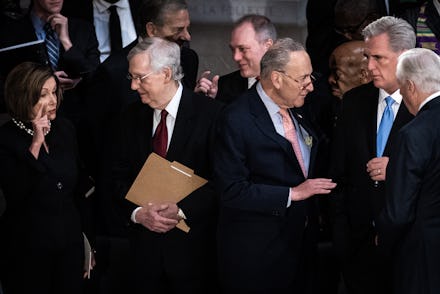While Americans waited for coronavirus relief, senators yelled at each other in D.C.

The Senate is deadlocked over a massive $1.8 trillion coronavirus economic stimulus package designed to protect Americans and the economy from ongoing pandemic. The package includes a mix of direct aid to taxpayers, as well as loans and bailouts for businesses. While leaders from the House, Senate, and White House have been working for days to hammer out a deal, a major sticking point still remains: A large portion of the money in the deal is directed toward the creation of $425 billion fund that the Federal Reserve can use to provide loans to companies — and even entire industries that are facing almost certain bankruptcy, like airlines.
Anger erupted on the Senate floor after Democrats blocked passage of the bill, seeking protections for workers from layoffs and regulations on how companies could spend the money. Specifically, they want to eliminate the possibility that bailed-out companies could use the money on stock buybacks, juicing their own stock value instead of, say, staving off layoffs. Democrats vowed not to move forward with the bill until it enshrined stronger protections for workers.
Democrats also object to the power the package gives to Treasury Secretary Steven Mnuchin, who is essentially allowed to unilaterally determine how the fund is allocated. They argued that it would serve as a personal “slush fund” for Mnuchin and criticized a provision that allows Mnuchin to keep the names of the companies that receive bailouts secret for six months after the money is spent. They were additionally concerned that President Trump could use the fund to directly support his own businesses.
Democrats' refusal to greenlight the package elicited predictable partisan blowback. The New York Times and several other outlets wrote headlines blaring that Democrats had "blocked" the stimulus bill, without providing additional context as to why. And with the stimulus bill coming as the third in a series of coronavirus relief bills, the details increasingly got lost Monday as negotiations devolved into the usual shouting about partisanship.
“Are you kidding me?” said Senate Majority Leader Mitch McConnell on the Senate floor after Democrats blocked passage of the bill. “This is not a juicy political opportunity, this is a national emergency.”
Speaking to reporters, Senate Minority Leader Chuck Schumer said that the bill was far too corporate-friendly and did not specifically provide enough help to health care workers on the front lines of battling the virus.
“We Democrats are trying to get things done, not making partisan speech after partisan speech,” Schumer said in the Senate, arguing that he’d been meeting repeatedly with Mnuchin to make a deal work. “Our goal is to reach a deal today, and we are hopeful, even confident, that we will meet that goal.”
Mnuchin told the Times that the two sides were “very close” to finishing their negotiations. “We are knocking down the issues,” he said. “We have been working all morning and we are not leaving until we have a deal.”
That deal likely won’t be arriving until at least Tuesday, however. On Monday afternoon, Republican Sen. Chuck Grassley (Iowa) told reporters that the deal “can’t get done tonight,” though The Washington Post reported a few hours later that “some key players were sounding increasingly positive.”
The price tag on the bill has ballooned to nearly $2 trillion, as relief measures would include direct payments to Americans in addition to the millions in relief for businesses, cities, and states. While the details are held up in negotiations, one thing is clear: The longer that the American public waits for this stimulus, the more people will suffer. Businesses will close, lacking cash, and people will default on mortgages and struggle with bills.
The fact that politics has delayed the package's passage is deeply concerning for the millions of Americans facing an uncertain future. It’s understandable why someone might blame Democrats at this juncture; after all, they’re technically the ones who are preventing the bill from being passed. But McConnell and the Republicans aren't blameless either. What Democrats are asking for isn’t a drastically revamped bill, but rather a piece of legislation with guardrails in place that would protect American workers and ensure that companies can’t use taxpayer money to boost profits while laying off employees — which, by the way, is what happened after the 2008 bailout.
If Democrats wanted to expedite relief — any relief, even if it's imperfect or incomplete — they could've done so. And if McConnell was as concerned about the national public health emergency unfolding before us as he was about making angry speeches on the Senate floor, he could've offered some logical concessions to Democrats without changing much about the bill.
Lawmakers are optimistic a deal will get done Tuesday. Until then, Americans will wait, as the Senate bickers and the clock runs down.